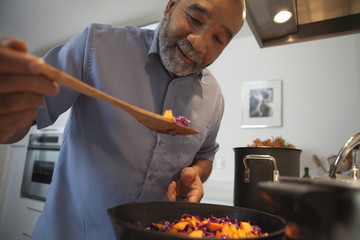It’s common knowledge that a healthy diet improves the way our mind and body works. Yet as we age, many people don’t realise our dietary requirements change too. Eating healthily from 50 and above becomes even more important, with different nutrients and food quantities required to keep us looking and feeling great.
Top tips on eating healthily from 50 onwards
A healthy diet is important no matter what age we are. Eating the right food and nutrients from age 50 and up is especially important. As we age, our bodies require fewer calories as we are generally less active. We also need to increase our consumption of certain foods containing calcium, fibre and healthy fats. To keep your body in tip-top shape, here are a few of our best tips on eating healthily from 50 and up.
- Choose multitasking foods – as well as eating a variety of foods to fuel your body, choose ones which will help to lower cholesterol or blood pressure too, such as bananas, oats and cholesterol-lowering spreads.
- Increase fibre and whole grains – eat more fibre rich foods and whole grains such as oats, fruit, vegetables and bran. This helps reduce your risk of heart disease and bowel cancer.
- Snack smart – instead of reaching for biscuits, crackers and chips, grab some raw nuts instead. Researchers found a diet high in Mediterranean foods such as nuts, reduces the risk of strokes, heart attacks and heart disease.
- Eat berries – give your brain an extra boost by eating berries such as strawberries and blueberries. These berries contain phytochemicals which may help reduce age-related memory issues and are also high in fibre, helping to keep your regular.
- Increase your calcium intake – as we get older, our bones are more easily fractured. To combat this, consume more calcium-rich foods such as low-fat yoghurt, cheese and milk. Eating high calcium foods also helps with halting muscle loss too.
- Use healthy fats – unsaturated and omega-3 fats help prevent coronary artery disease, heart attacks and strokes. Foods such as avocados, seeds and tuna all contain healthy omega-3 fats.
Signs you may be suffering from nutrient deficiencies
 Keep a lookout for signs and symptoms which may show you are not eating enough of the right nutrients. These include pale or bleeding gums, forgetfulness and feeling sluggish. If you have any concerns about your health, make an appointment to see your doctor who can help you identify areas of concern in your diet.
Keep a lookout for signs and symptoms which may show you are not eating enough of the right nutrients. These include pale or bleeding gums, forgetfulness and feeling sluggish. If you have any concerns about your health, make an appointment to see your doctor who can help you identify areas of concern in your diet.
For more information about eating healthily from 50 and onwards, check out our large range of health and wellbeing articles right here at GrownUps.









janm86640 - 5 years ago
Why is it that NZ nutritionists ( some of them) still push a low fat diet. Good saturated fats are far better for us than ordinary vegetable oils, It is dangerous to have a high Omega 6 level in our body. Milk and other dairy products should be full-fat and preferably raw. Milk, meat etc should be from grass fed animals. We do have some feedlots in NZ now.